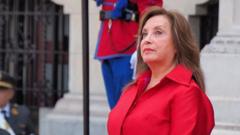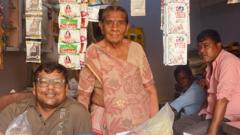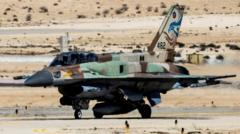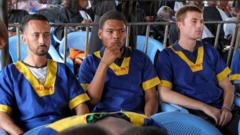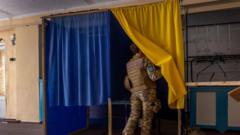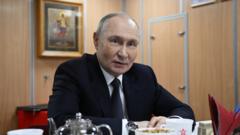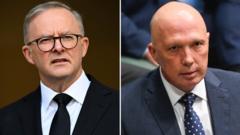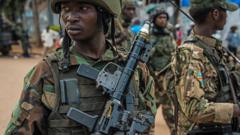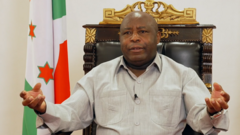Amid rising tensions in the conflict-ridden east, the actions against Kabila's party get highlighted as he returns from exile, raising questions over his potential influence in ongoing unrest.
DR Congo's Government Prohibits Former President's Party Amid Rebel Allegations
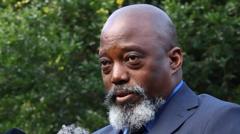
DR Congo's Government Prohibits Former President's Party Amid Rebel Allegations
The Congolese government has banned Joseph Kabila's political party over alleged connections to the M23 rebel group.
On the backdrop of political turmoil and rebel activities in the eastern Democratic Republic of Congo (DRC), the government has officially prohibited the activities of the People's Party for Reconstruction and Democracy (PPRD), which is led by former President Joseph Kabila. This escalation comes alongside accusations that Kabila has ties to the M23 rebel group, which has seized significant territories in the region since early 2023.
Kabila, who ruled the DRC for 18 years after succeeding his father Laurent, allegedly returned to Goma amidst these conflicts. Goma has been under the M23's partial control since January this year and is notably supported by Rwandan forces. With Kabila's return, the Congolese Ministry of Interior issued a statement declaring that all functions of the PPRD were suspended due to its ambiguous stance regarding the rebel occupation of Congolese territory. The ministry implied that Kabila’s presence in Goma raised serious concerns as he was said to be guarded by "the enemy."
In response to the government's actions, Kabila, now 53, expressed previous intentions to return to the DRC and address the nation, although he refrained from commenting on current allegations of high treason. His spokesperson claimed he would soon communicate with the Congolese populace, further complicating the narrative amid a turbulent political atmosphere.
The M23 spokesperson stated that they neither confirmed nor denied Kabila's presence in Goma but suggested that it posed no issue. This reticence has managed to intensify public scrutiny over Kabila's motives for returning after spending two years in South Africa, where he stated he studied geopolitics.
Kabila's complex legacy includes being the last DRC president who held onto power after a contested election, having passed authority to current President Félix Tshisekedi in 2019. However, Kabila has faced accusations of orchestrating behind-the-scenes maneuvers to retain influence and control through his political allies, including those connected to the M23. Observers recall the historical precedent set by Kabila’s father, who also returned to Congo from the east during a previous civil conflict, which adds another layer of complexity to a rapidly unfolding situation.
Analysts caution that Kabila's bid to reclaim a role in resolving the deepening security crisis amidst returning tensions will be closely monitored, questioning whether his involvement will aid or further complicate peace efforts in the region. As DR Congo faces rampant instability, many eyes will be glued to Kabila's next steps and the government's response to an increasingly fragmented political landscape.
Kabila, who ruled the DRC for 18 years after succeeding his father Laurent, allegedly returned to Goma amidst these conflicts. Goma has been under the M23's partial control since January this year and is notably supported by Rwandan forces. With Kabila's return, the Congolese Ministry of Interior issued a statement declaring that all functions of the PPRD were suspended due to its ambiguous stance regarding the rebel occupation of Congolese territory. The ministry implied that Kabila’s presence in Goma raised serious concerns as he was said to be guarded by "the enemy."
In response to the government's actions, Kabila, now 53, expressed previous intentions to return to the DRC and address the nation, although he refrained from commenting on current allegations of high treason. His spokesperson claimed he would soon communicate with the Congolese populace, further complicating the narrative amid a turbulent political atmosphere.
The M23 spokesperson stated that they neither confirmed nor denied Kabila's presence in Goma but suggested that it posed no issue. This reticence has managed to intensify public scrutiny over Kabila's motives for returning after spending two years in South Africa, where he stated he studied geopolitics.
Kabila's complex legacy includes being the last DRC president who held onto power after a contested election, having passed authority to current President Félix Tshisekedi in 2019. However, Kabila has faced accusations of orchestrating behind-the-scenes maneuvers to retain influence and control through his political allies, including those connected to the M23. Observers recall the historical precedent set by Kabila’s father, who also returned to Congo from the east during a previous civil conflict, which adds another layer of complexity to a rapidly unfolding situation.
Analysts caution that Kabila's bid to reclaim a role in resolving the deepening security crisis amidst returning tensions will be closely monitored, questioning whether his involvement will aid or further complicate peace efforts in the region. As DR Congo faces rampant instability, many eyes will be glued to Kabila's next steps and the government's response to an increasingly fragmented political landscape.




